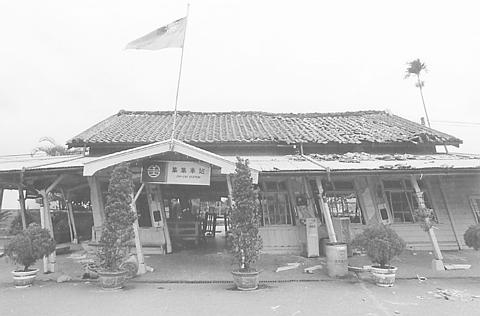The massive 921 earthquake not only claimed the lives of thou-sands of Taiwanese and their homes -- it left dozens of Taiwan's historic sites in ruins.
While an overall inspection of Taiwan's 388 national historic sites is being undertaken by the Ministry of Interior (MOI), some of the sites may unfortunately be gone forever because they were so severely damaged, according to the MOI's Civil Affairs director Chi Chun-chen (紀俊臣).
Among the damaged sites, the 200-year old Lin Family Gardens in Wufeng (

PHOTO: LU CHUN-WEI, LIBERTY TIMES
"Ninety percent of the wooden buildings were destroyed," Chi said, after checking the site with experts.
Ironically, according to Lin Cheng-chi (
The Lin family complex was owned by the wealthiest family in central Taiwan.
The complex, which covered 3,888 square meters, preserved many fine examples of Chinese-style architecture of the Ching dynasty. But the quake two weeks ago demolished nearly the whole area and claimed the lives of two members of the Lin clan.
"All that can be done now is to preserve the wooden relics and antiques left in the debris," Chi said. "We are still considering if we will rebuild the site or abolish it."
According to an initial estimate by the interior ministry, it could take more than NT$100 million to rebuild the complex.
Like the Lin mansion, the Lungshan Temple (龍山寺) in Lukan (鹿港), Chanhua County, was seriously damaged and will require NT$20 million to repair.
In Nantou County, three classical academies -- Mingshin (明新), Tengyen (登簷) and Lantien (藍田) -- were partly collapsed and will also require several millions of dollars for reconstruction, said Chi.
So far, the government has budgeted NT$250 million for emergency repair of damaged historic sites.
However, according to architect Yang Ren-chiang (
At the same time, both legislators and cultural heritage preservation groups urged the government take a closer look at other unregistered historical buildings.
DPP lawmaker Fan Shun-lu (
"As buildings with indicative red tape on them will be demolished within a week under the government's emergency decree, we are worried that those marked historic buildings will also be demolished," said Fan.
Among those buildings, the Chichi Railway Station (集集火車站) -- once a famous tourist spot -- was one of those dangerous buildings, according to Chiu Ru-hua (丘如華) of the Yaoshan Foundation (樂山文教基金會).
In response, Lin Cheng-chi has vowed to save the Chichi station from the wrecking ball.
"We will rebuild the station, and make it a symbol [of inspiration] to help the quake-stricken town stand up again," Lin said.
The Yaoshan Foundation has organized architectural scholars and students to form the League for 921 Reconstruction of Cultural Heritage.
So far, hundreds of professionals have gone to disaster sites for volunteer inspections.

CALL FOR SUPPORT: President William Lai called on lawmakers across party lines to ensure the livelihood of Taiwanese and that national security is protected President William Lai (賴清德) yesterday called for bipartisan support for Taiwan’s investment in self-defense capabilities at the christening and launch of two coast guard vessels at CSBC Corp, Taiwan’s (台灣國際造船) shipyard in Kaohsiung. The Taipei (台北) is the fourth and final ship of the Chiayi-class offshore patrol vessels, and the Siraya (西拉雅) is the Coast Guard Administration’s (CGA) first-ever ocean patrol vessel, the government said. The Taipei is the fourth and final ship of the Chiayi-class offshore patrol vessels with a displacement of about 4,000 tonnes, Lai said. This ship class was ordered as a result of former president Tsai Ing-wen’s (蔡英文) 2018

‘SECRETS’: While saying China would not attack during his presidency, Donald Trump declined to say how Washington would respond if Beijing were to take military action US President Donald Trump said that China would not take military action against Taiwan while he is president, as the Chinese leaders “know the consequences.” Trump made the statement during an interview on CBS’ 60 Minutes program that aired on Sunday, a few days after his meeting with Chinese President Xi Jinping (習近平) in South Korea. “He [Xi] has openly said, and his people have openly said at meetings, ‘we would never do anything while President Trump is president,’ because they know the consequences,” Trump said in the interview. However, he repeatedly declined to say exactly how Washington would respond in

WARFARE: All sectors of society should recognize, unite, and collectively resist and condemn Beijing’s cross-border suppression, MAC Minister Chiu Chui-cheng said The number of Taiwanese detained because of legal affairs by Chinese authorities has tripled this year, as Beijing intensified its intimidation and division of Taiwanese by combining lawfare and cognitive warfare, the Mainland Affairs Council (MAC) said yesterday. MAC Minister Chiu Chui-cheng (邱垂正) made the statement in response to questions by Democratic Progressive Party (DPP) Legislator Puma Shen (沈柏洋) about the government’s response to counter Chinese public opinion warfare, lawfare and psychological warfare. Shen said he is also being investigated by China for promoting “Taiwanese independence.” He was referring to a report published on Tuesday last week by China’s state-run Xinhua news agency,

‘ADDITIONAL CONDITION’: Taiwan will work with like-minded countries to protect its right to participate in next year’s meeting, the foreign ministry said The US will “continue to press China for security arrangements and protocols that safeguard all participants when attending APEC meetings in China,” a US Department of State spokesperson said yesterday, after Beijing suggested that members must adhere to its “one China principle” to participate. “The United States insists on the full and equal participation of all APEC member economies — including Taiwan — consistent with APEC’s guidelines, rules and established practice, as affirmed by China in its offer to host in 2026,” the unnamed spokesperson said in response to media queries about China putting a “one China” principle condition on Taiwan’s